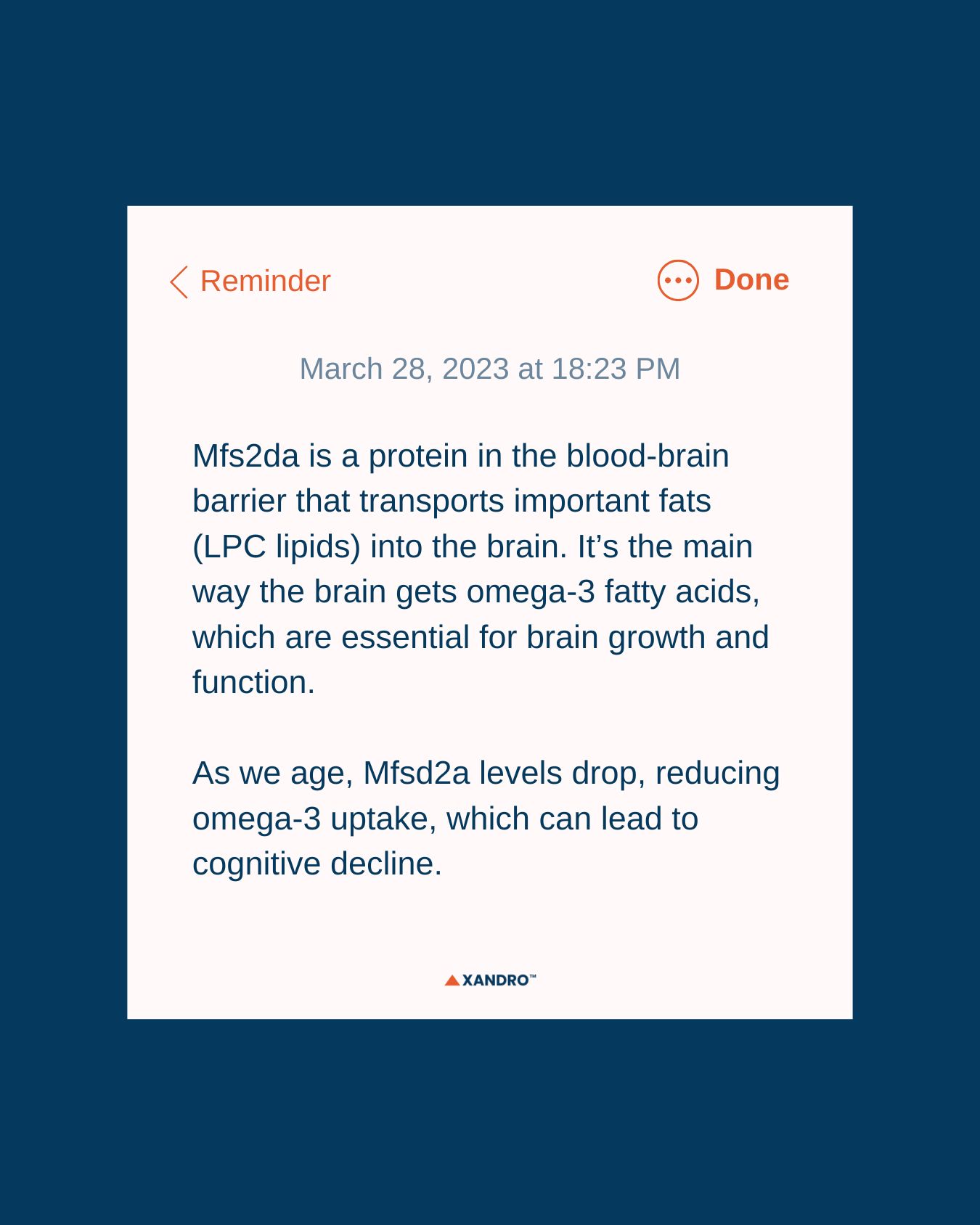What’s Mfs2da? Function, Protein, Transporter & Omega-3 Role
10th Nov 2024
Mfs2da’s Role in Brain Health
You may have heard about Mfs2da in the longevity circles, so, before you get started, to provide a bit of context around Mfs2da, have a read of our article about LPC-EPA/DHA!
If you already know about LPC-EPA/DHA, you might know that the mfs2da protein helps transport LPC-DHA/EPA into the brain. Simple, right?
Yes, but it’s a bit more complex than that, especially since its discovery has brought about improved omega-3 supplements to help with our brain health, so let’s get into it.
What is Mfs2da?
The Major Facilitator Superfamily (MFS) is a large group of proteins that move various substances, like sugars, ions and drugs, in and out of cells. These proteins are essential for many bodily processes.
The Mfsd2a transporter is a special MFS protein found in tissues like the brain, liver and spinal cord. It plays a critical role in maintaining the blood-brain barrier (BBB), a shield that protects the brain from harmful substances.
What makes it so important though is that it’s a protein in the blood-brain barrier that transports important fats (LPC lipids) into the brain. It’s the main way the brain gets omega-3 fatty acids, which are essential for brain growth and function.
What is the Function of Mfs2da in Brain Health?
As mentioned, Mfsd2a is a key transporter protein in the BBB. It helps protect the brain by transporting DHA (an essential omega-3 fatty acid) into the brain and regulating the barrier’s structure and function.
EPA and DHA can enter the brain and eyes when they are in the LPC form and are transported by a specific protein called Mfsd2a. This is why traditional omega-3 supplements (fish oil) don’t do much for our brain health, as the EPA and DHA can barely cross the BBB. This could be because EPA gets broken down quickly or lost from brain cell membranes.
Without Mfsd2a, brain DHA levels drop, leading to cognitive problems, anxiety and smaller brain size (microcephaly). People with a genetic deficiency in Mfsd2a have severe microcephaly (small brains), intellectual disabilities, and low levels of brain myelin — the insulation needed for proper neuron function. As we age, Mfsd2a levels drop, reducing omega-3 uptake, which can lead to cognitive decline.

How Does Mfsd2a Maintain the Blood-Brain Barrier?
Mfsd2a helps keep the BBB intact by reducing certain types of transport that could harm the brain. It also works with other molecules to prevent brain swelling and repair brain injuries.
How Does Mfsd2a Transport DHA and EPA?
EPA/DHA plays a crucial role in brain development and health. Mfsd2a only transports DHA and EPA when it’s attached to a molecule called LPC. This allows the brain to absorb DHA efficiently, promoting brain growth and function.
Without Mfsd2a, the brain can't get enough DHA and EPA, leading to issues like cognitive decline and poor brain development. Increasing DHA/EPA through LPC-DHA/EPA supplements can help reduce the risk of neurodegenerative diseases.
Other Mfsd2a Functions
Mfsd2a is also involved in cell fusion and placenta development and may play a role in cancer. It could help improve drug delivery for brain diseases like Alzheimer's and brain infections.
Studies suggest Mfsd2a could aid the treatment of conditions like brain tumours, strokes and neurodegenerative diseases, but more clinical research is needed.
One of its great potentials is that Mfsd2a could improve drug delivery to the brain, making it valuable for treating conditions like Alzheimer’s and brain injuries. Research on this transporter helps us better understand brain protection and development.
End Note
Since LPC-forms of omega-3 fatty acids have been found to enter the brain more effectively, due to the Mfsd2a gene, this could offer better neuroprotective benefits for those with ApoE4, a genetic condition that increases the risk of Alzheimer's disease and people simply getting older who want to maintain their brain health.
Due to Mfsd2a, LPC-bound omega-3 supplements are being produced to help improve brain health and reduce the risk of cognitive decline.
LYSOVETA™ is one such ingredient/supplement that Xandro uses in its LPC Neuro™ supplement.
LPC Neuro™ is a natural source of LPC, supporting brain function by boosting omega-3 levels, especially as we age. Since ageing leads to oxidative damage in neuron membranes, essential for memory and thinking, the brain needs omega-3-rich phospholipids to repair these membranes constantly.
LPC Neuro™ delivers the right type of omega-3 directly to the brain, helping maintain cognitive health and protect against age-related decline. Learn more about it here!
